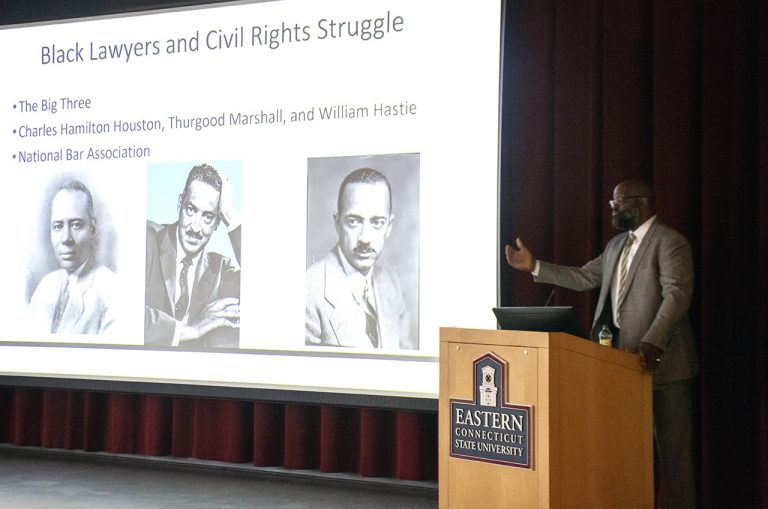- Apply
- Visit
- Request Info
- Give
Eastern Hosts Book Talk on Forgotten Civil Rights Activist
Written by Raven Dillon
Published on February 20, 2019

Eastern Connecticut State University welcomed Connecticut College Professor David Canton on Feb. 20 to discuss his new book, “Raymond Pace Alexander: A New Negro Lawyer Fights for Civil Rights in Philadelphia.” In this biography, Canton examines a prominent Civil Rights activist and attorney who has been long forgotten by modern historians.
Canton opened the University Hour event by analyzing Northern racial tensions, which are often ignored during discussions of the Civil Rights movement. “When we think of Civil Rights, we think of the South,” Canton said. “We think of Dr. King, Rosa Parks, dogs, buses, water fountains – it’s a very linear progression. There’s no nuance. It’s like a sitcom.”
The Northern Civil Rights movement, Canton argued, is not linear. Northern states such as Pennsylvania adopted Jim Crow laws, instilling a segregated society that relied on rigid social norms to keep the races separate. This, Canton explained, is de facto racism – social customs that aren’t written as law, but nonetheless established a hierarchical racist society.
Canton went on to discuss Alexander, who was a Harvard graduate and a well-known black attorney in Philadelphia. Alexander operated in the de facto racism of Philadelphia and became a major contributor to improving the status of black lawyers. In order to make progress in a world so tightly constrained by segregation, Alexander often changed his political platforms and stances.
In the 1930s, Alexander worked with left-wing organizations to desegregate an all-white elementary school, but after World War II, he became an anti-communist and formed coalitions with like-minded whites. In the 1960s, Alexander criticized Black Power rhetoric, but shared similar philosophies such as black political empowerment and studying black history. By the late sixties, he focused on economic justice by advocating a Marshall Plan for poor Americans and supporting affirmative action.
“Racism is an institutional system,” Canton concluded. “It’s not the actions of some bad folks. It’s systemic, and we need to be systemic about eradicating it from our institutions.”


